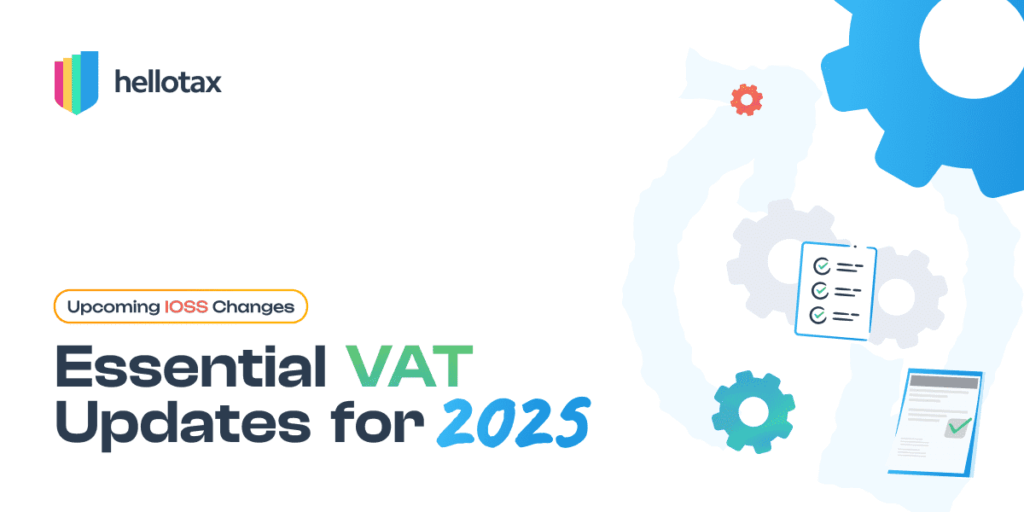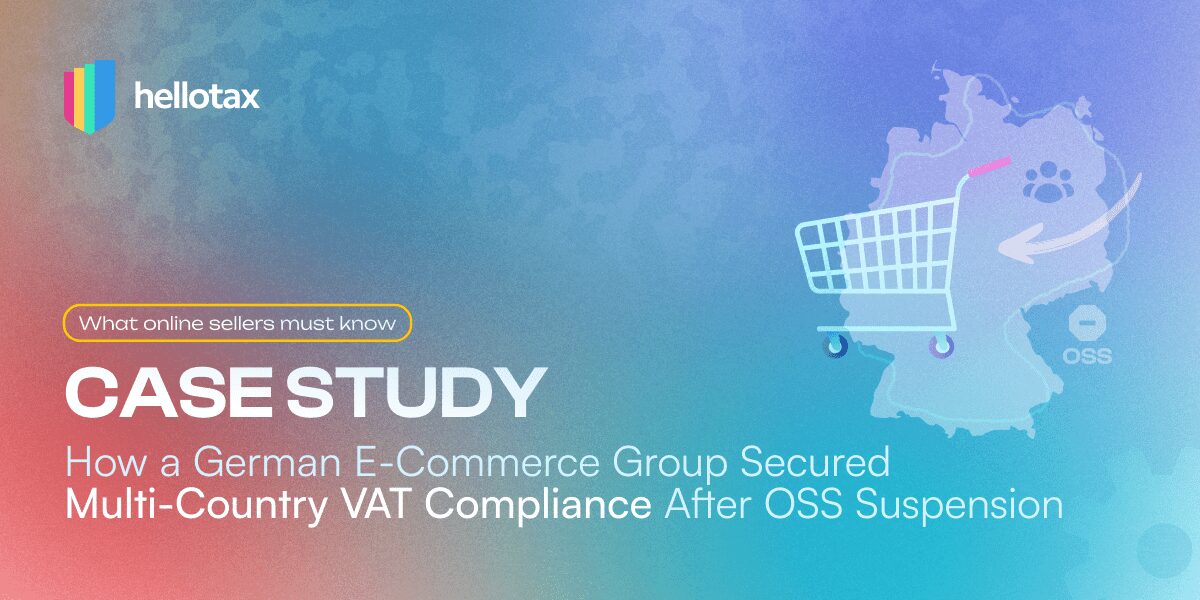Brenda Varela
Last Updated on 8 September 2025
Navigating upcoming IOSS changes is crucial for online sellers operating within the European Union market. Major changes are scheduled for 2028, but actions need to be taken earlier. Understanding what’s changing can significantly impact your operations, compliance processes, and overall profitability. This article details these essential updates and offers clear, actionable steps to ensure your business remains compliant and competitive.
1. Introduction: Preparing for VAT IOSS Changes in 2028
Since its inception in 2021, the Import One-Stop Shop (IOSS) has dramatically simplified VAT compliance for online sellers importing goods valued at €150 or less into the EU. As of July 2028, substantial updates will further redefine VAT responsibilities. These changes aim to enhance tax compliance and create a fairer competitive landscape, particularly targeting non-EU sellers and businesses currently using simplified procedures. Early preparation is key to adapting smoothly, avoiding disruptions, and maintaining efficient operations.
2. What’s New with the IOSS from July 2028?
Abolition of the Special Arrangement Scheme
The existing Special Arrangement Scheme, which currently allows postal operators and couriers to collect VAT at the point of delivery for low-value imports (instead of requiring the seller to register via IOSS), will be discontinued. Sellers who currently benefit from this simplified process must now directly register for the IOSS to maintain compliance. Without this registration, sellers risk significant delays at customs and possible penalties for non-compliance.
Increased VAT Obligations for Non-IOSS Registered Sellers
For sellers who choose not to register with the IOSS, the regulatory landscape will become more challenging. These businesses will now need to register separately for VAT in each EU member state where their customers reside. This process significantly increases the administrative burden, compliance costs, and complexity, making IOSS registration an attractive option for sellers wanting to simplify cross-border trade.
Joint Liability for Customs Intermediaries
Perhaps the most significant change for sellers utilizing customs agents or intermediaries is the introduction of joint liability for unpaid VAT. Under the new rules, these intermediaries could be held accountable alongside sellers for any unpaid import VAT. This regulatory update will likely lead to intermediaries enforcing stricter requirements and higher costs for managing VAT processes, directly impacting sellers’ overall costs and operational complexity.
Potential Changes to the €150 Threshold
It’s also important to stay informed about potential changes to the current €150 VAT exemption threshold for low-value goods. Depending on the EU’s policy direction, the €150 threshold may be removed or modified in 2028. While not confirmed, further changes such as the removal of the €150 exemption may also be considered—stay informed through official EU channels.
👉 New to IOSS? If you’re not yet familiar with how the Import One-Stop Shop works or whether it’s the right solution for your business, check out our comprehensive guide: IOSS for Non-EU Sellers. It covers everything from how to register to what kind of goods qualify—perfect for understanding the basics before diving into the 2028 updates.
3. Who is Affected by These IOSS Changes?
The forthcoming IOSS updates impact a wide range of online sellers:
- Sellers currently relying on postal services or couriers that collect VAT at the point of delivery.
- Businesses regularly exporting goods valued below €150 into multiple EU countries but not registered for IOSS.
- Sellers heavily dependent on customs intermediaries for handling their import VAT processes.
It’s important to note that IOSS remains an optional scheme—it is not mandatory. However, it is highly recommended for sellers who want to avoid the administrative burden of registering for VAT in each EU member state. By clearly identifying whether your business falls into these categories, you can proactively address these regulatory shifts and implement the necessary changes to stay ahead.
To find out more about the changes in the law, read here.
4. Practical Tips to Ensure VAT Compliance
Proactive steps to smoothly adapt to the new IOSS landscape include:
- Early IOSS Registration: Initiate the registration process well before July 2028 to ensure a smooth transition without disruptions to your sales processes.
- Evaluate and Update VAT Procedures: Review your existing VAT management practices, particularly focusing on your relationship with customs intermediaries. Make necessary adjustments to meet the new joint-liability regulations.
- Upgrade IT and Reporting Systems: Ensure your digital systems can handle the new VAT reporting and compliance demands, including real-time VAT calculation and accurate electronic reporting.
Common Pitfalls to Avoid
- Avoid delaying your response to regulatory changes. Last-minute preparations often lead to mistakes and compliance issues.
- Don’t underestimate the added administrative and financial burdens if you choose not to register for IOSS.
- Ensure intermediary agreements explicitly address the new liabilities to prevent unforeseen operational disruptions and costs.

Book a free consultation
Our VAT experts are happy to help you. Book a free consultation today!
5. How hellotax Supports Your Business Through VAT IOSS Changes
At hellotax, we are committed to simplifying VAT compliance for online sellers, ensuring your business transitions smoothly into the new regulatory framework:
- Automated VAT Compliance: Our automated solutions handle VAT registration and filing seamlessly, significantly reducing administrative workloads and minimizing compliance risks.
- Real-time VAT Monitoring and Alerts: With our sophisticated monitoring tools, you can track compliance requirements and deadlines effectively, receiving timely alerts to stay ahead of VAT obligations.
- Fiscal Representation Services: In EU countries requiring fiscal representation, hellotax provides comprehensive support, ensuring your business maintains complete regulatory compliance effortlessly.
Ready to effortlessly manage your VAT compliance? hellotax offers automated VAT filing solutions, real-time compliance monitoring, and expert fiscal representation services. Contact us today to ensure your business is fully prepared and compliant with the upcoming IOSS changes in 2028.
6. Conclusion: Act Now to Avoid Future Compliance Issues
The upcoming IOSS changes are significant but manageable. By acting proactively and utilizing professional support like hellotax, you can avoid disruptions, simplify your compliance processes, and maintain your competitive advantage in the European market.
Looking Ahead: Why Early Preparation Matters
With July 2028 approaching, businesses must think beyond just regulatory deadlines. Transitioning from the Special Arrangement Scheme and adapting to potential joint liability rules will take time, planning, and reliable tools. Preparing your logistics, payment workflows, and VAT infrastructure now can prevent compliance risks and costly shipping delays in the future. Even small online sellers should assess their eligibility for IOSS and begin discussions with an intermediary as early as possible. At hellotax, we specialize in supporting businesses of all sizes through complex EU VAT transitions—before they become urgent.
Key Takeaway:
Online sellers should prepare now for significant IOSS changes in 2028, ensuring ongoing VAT compliance, streamlined operations, and minimized disruption by leveraging professional support from hellotax.
✅ Ready to future-proof your IOSS compliance?
The 2028 IOSS changes will reshape how online sellers handle VAT in the EU. Don’t wait until deadlines catch up—let hellotax simplify your transition. From IOSS registration to monthly reporting and expert fiscal representation, we take care of the admin so you can focus on growth.
👉 Book a free consultation with our VAT experts today and stay ahead of every change.




